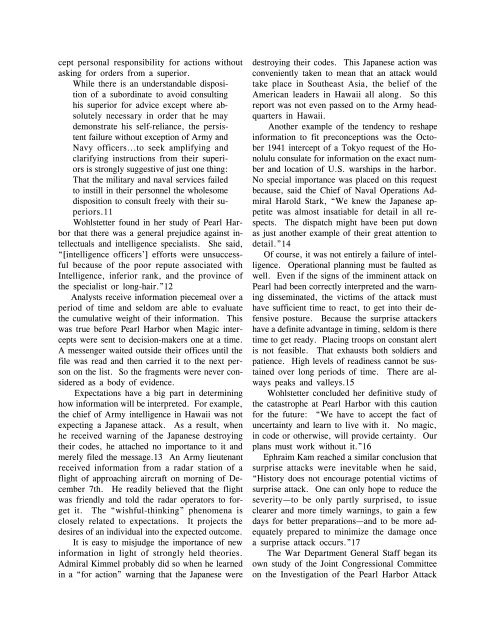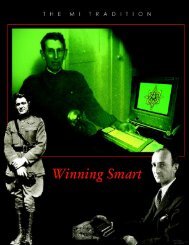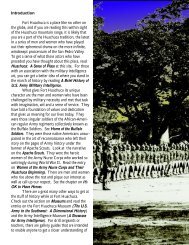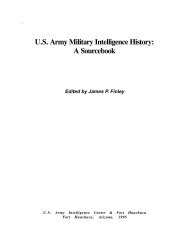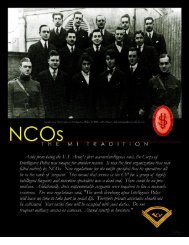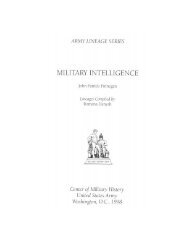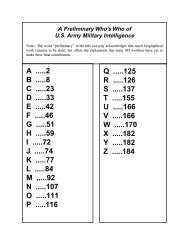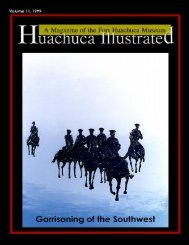The Uncertain Oracle: Some Intelligence Failures ... - U.S. Army
The Uncertain Oracle: Some Intelligence Failures ... - U.S. Army
The Uncertain Oracle: Some Intelligence Failures ... - U.S. Army
- No tags were found...
Create successful ePaper yourself
Turn your PDF publications into a flip-book with our unique Google optimized e-Paper software.
cept personal responsibility for actions withoutasking for orders from a superior.While there is an understandable dispositionof a subordinate to avoid consultinghis superior for advice except where absolutelynecessary in order that he maydemonstrate his self-reliance, the persistentfailure without exception of <strong>Army</strong> andNavy officers...to seek amplifying andclarifying instructions from their superiorsis strongly suggestive of just one thing:That the military and naval services failedto instill in their personnel the wholesomedisposition to consult freely with their superiors.11Wohlstetter found in her study of Pearl Harborthat there was a general prejudice against intellectualsand intelligence specialists. She said,“[intelligence officers’] efforts were unsuccessfulbecause of the poor repute associated with<strong>Intelligence</strong>, inferior rank, and the province ofthe specialist or long-hair.”12Analysts receive information piecemeal over aperiod of time and seldom are able to evaluatethe cumulative weight of their information. Thiswas true before Pearl Harbor when Magic interceptswere sent to decision-makers one at a time.A messenger waited outside their offices until thefile was read and then carried it to the next personon the list. So the fragments were never consideredas a body of evidence.Expectations have a big part in determininghow information will be interpreted. For example,the chief of <strong>Army</strong> intelligence in Hawaii was notexpecting a Japanese attack. As a result, whenhe received warning of the Japanese destroyingtheir codes, he attached no importance to it andmerely filed the message.13 An <strong>Army</strong> lieutenantreceived information from a radar station of aflight of approaching aircraft on morning of December7th. He readily believed that the flightwas friendly and told the radar operators to forgetit. <strong>The</strong> “wishful-thinking” phenomena isclosely related to expectations. It projects thedesires of an individual into the expected outcome.It is easy to misjudge the importance of newinformation in light of strongly held theories.Admiral Kimmel probably did so when he learnedin a “for action” warning that the Japanese weredestroying their codes. This Japanese action wasconveniently taken to mean that an attack wouldtake place in Southeast Asia, the belief of theAmerican leaders in Hawaii all along. So thisreport was not even passed on to the <strong>Army</strong> headquartersin Hawaii.Another example of the tendency to reshapeinformation to fit preconceptions was the October1941 intercept of a Tokyo request of the Honoluluconsulate for information on the exact numberand location of U.S. warships in the harbor.No special importance was placed on this requestbecause, said the Chief of Naval Operations AdmiralHarold Stark, “We knew the Japanese appetitewas almost insatiable for detail in all respects.<strong>The</strong> dispatch might have been put downas just another example of their great attention todetail.”14Of course, it was not entirely a failure of intelligence.Operational planning must be faulted aswell. Even if the signs of the imminent attack onPearl had been correctly interpreted and the warningdisseminated, the victims of the attack musthave sufficient time to react, to get into their defensiveposture. Because the surprise attackershave a definite advantage in timing, seldom is theretime to get ready. Placing troops on constant alertis not feasible. That exhausts both soldiers andpatience. High levels of readiness cannot be sustainedover long periods of time. <strong>The</strong>re are alwayspeaks and valleys.15Wohlstetter concluded her definitive study ofthe catastrophe at Pearl Harbor with this cautionfor the future: “We have to accept the fact ofuncertainty and learn to live with it. No magic,in code or otherwise, will provide certainty. Ourplans must work without it.”16Ephraim Kam reached a similar conclusion thatsurprise attacks were inevitable when he said,“History does not encourage potential victims ofsurprise attack. One can only hope to reduce theseverity—to be only partly surprised, to issueclearer and more timely warnings, to gain a fewdays for better preparations—and to be more adequatelyprepared to minimize the damage oncea surprise attack occurs.”17<strong>The</strong> War Department General Staff began itsown study of the Joint Congressional Committeeon the Investigation of the Pearl Harbor Attack


